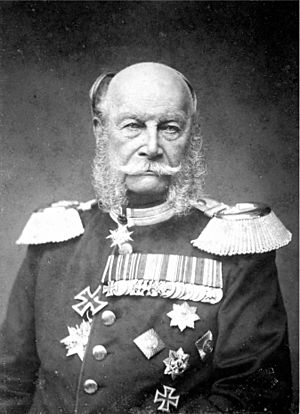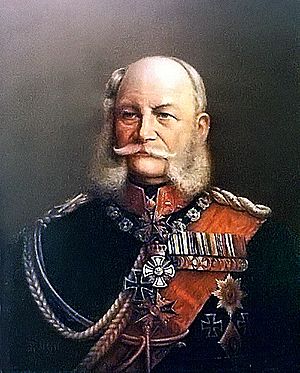Wilhelm I of Germany facts for kids
|
||||||||||||||||||||||||||||||||||||||||||||||||||||||||
Wilhelm I was a very important leader from the Hohenzollern family. He was the king of Prussia from 1861 to 1888. He also became the first German Emperor in 1871, ruling until his death in 1888. His full name was Wilhelm Friedrich Ludwig von Hohenzollern. He was born on March 22, 1797, and passed away on March 9, 1888. In English, his name is "William."
During his time as king, Wilhelm worked closely with his prime minister, Otto von Bismarck. Together, they helped unite many smaller German countries into one powerful nation. This big change happened after they won the Franco-Prussian War. This victory led to the creation of the German Empire.
Years later, Wilhelm's grandson, Wilhelm II, ordered the building of the Kaiser Wilhelm Gedächtniskirche. This church was built to honor Wilhelm I's life and all his achievements.
Contents
Becoming King of Prussia
Wilhelm became the King of Prussia on January 2, 1861. Prussia was one of the strongest German states at the time. His coronation, which is a special ceremony where a king is officially crowned, happened on October 18, 1861. This event took place at Königsberg Castle.
Uniting the German States
One of the most important things Wilhelm I did was help unite many different German states. Before him, Germany was not a single country. It was made up of many smaller kingdoms, duchies, and free cities. Wilhelm and his clever prime minister, Otto von Bismarck, worked hard to bring these states together.
Their efforts led to several wars, including the Franco-Prussian War (1870-1871). Prussia and its allies won this war against France. This victory was a huge step towards creating a unified Germany.
The German Empire Begins
After the victory in the Franco-Prussian War, the German states officially came together. On January 18, 1871, a very important event happened. Wilhelm I was proclaimed the first German Emperor in the famous Hall of Mirrors at the Palace of Versailles in France. This moment marked the official start of the German Empire.
As Emperor, Wilhelm I was the head of this new, strong German nation. He continued to rule as both German Emperor and King of Prussia until his death.
His Legacy
Wilhelm I is remembered for his role in creating modern Germany. He was a steady and respected leader. His partnership with Otto von Bismarck was key to uniting the country and making it a major power in Europe. His reign saw Germany become a strong, unified empire.
Related pages
Images for kids
-
Caricature of William I by Thomas Nast which appeared in The Fight at Dame Europa's School by Henry William Pullen.
-
Coronation of William I as King of Prussia at Königsberg Castle in 1861
-
William I is proclaimed German Emperor in the Hall of Mirrors in Versailles, France (painting by Anton von Werner)
See also
 In Spanish: Guillermo I de Alemania para niños
In Spanish: Guillermo I de Alemania para niños
 | Dorothy Vaughan |
 | Charles Henry Turner |
 | Hildrus Poindexter |
 | Henry Cecil McBay |










